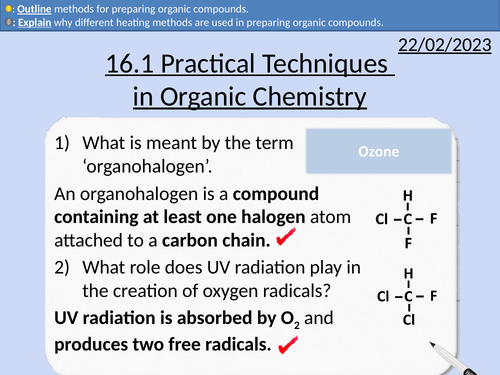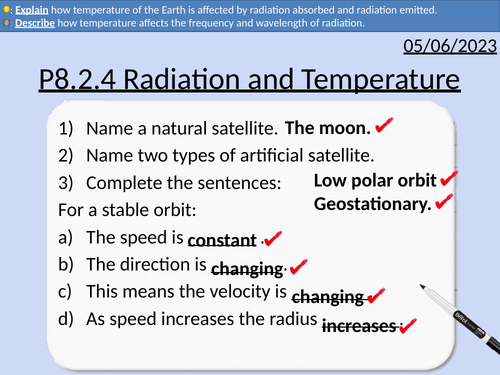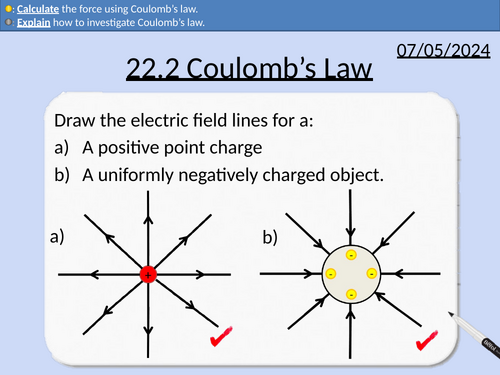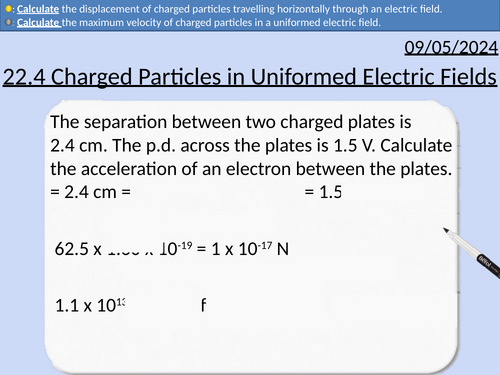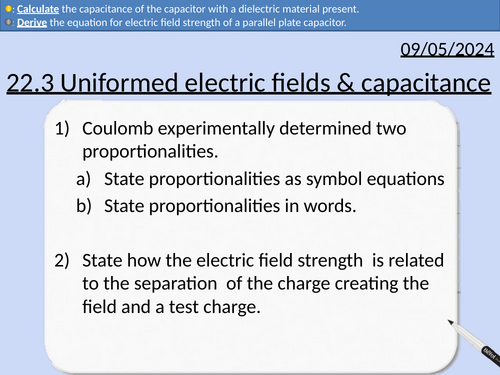496Uploads
163k+Views
70k+Downloads
All resources

OCR AS Chemistry: Practical Techniques in Organic Chemistry
OCR AS Chemistry: 16.1 Practical Techniques in Organic Chemistry
This PowerPoint is a whole lessons included with student activities, animated answers, homework questions with answers provided.
This lesson covers:
Heating under reflux
Distillation
Re-distillation
Purifying Organic Products
Removing impure acids from organic compounds
Drying agents
Bundle

OCR AS Chemistry: Module 4 Organic Chemistry
This bundle includes all PowerPoint lessons for Module 4 Organic Chemistry.
All PowerPoints are whole lessons included with student activities, animated answers, homework questions with answers provided.
Basic concepts of organic chemistry
Organic Chemistry
Nomenclature of organic compounds
Representing the formulae of organic compounds
Isomerism
Introduction to reaction mechanisms
Alkanes
Properties of the alkanes
Chemical reactions of the alkanes
Alkenes
Properties of the alkenes
Stereoisomerism
Reactions of alkenes
Electrophilic addition in alkenes
Polymerisation in alkenes
Alcohols
Properties of alcohols
Reactions of alcohols
Haloalkanes
The chemistry of haloalkanes
Organohalogen compounds in the environment
Organic Synthesis
Practical techniques in organic chemistry
Synthetic routes
Spectroscopy
Mass spectrometry
Infrared spectroscopy

GCSE Physics: Radiation and Temperature
This presentation covers OCR Gateway Physics 9-1 P8.3.4 Radiation and Temperature
This PowerPoint is a whole lessons included with student activities and animated answers.
All objects emit electromagnetic radiation
Describe how changing temperature changes frequency, wavelength, and intensity of the radiation produced.
Explain why objects change temperature by absorbing and emitting radiation.
Explain why the temperature of the Earth changes due to greenhouse gases in the atmosphere.

A Level Chemistry: The Chemistry of Phenol
OCR A level Chemistry: 25.3 The Chemistry of Phenol
This PowerPoint is a whole lesson included with student activities, animated answers, homework questions with answers provided.
This lesson covers:
Naming phenols
Distinguishing between phenols and alcohols
Distinguishing between phenols and alkenes
Distinguishing between phenols and carboxylic acids
Phenol as a weak acid
Electrophilic reactions with phenols
Comparing and explaining the reactivity of phenols and benzene
Bundle

GCSE OCR Physics: P2.3 Forces in action
All resources for P2.3 GCSE OCR Physics Gateway 9-1.Triple and comined (Higher and Foundation) is covered in this material.
Includes:
• Stretching springs
• Stretching materials and storing energy
• Gravitational Fields and Potential Energy
• Turning Forces
• Simple Machines
• Hydraulics

GCSE Physics: Electrical Current Practical Activity
This presentation covers OCR Gateway Physics 9-1 P3.1.2 Electrical Current
Electron flow and conventional current
Measuring current with ammeters
Series and parallel circuits
Comparing current at junctions

OCR A level Physics: Coulomb’s Law
OCR A level Physics: 22.2 Coulomb’s Law
Module 6 Particles and Medical Physics
This PowerPoint is a whole lesson included with student activities, animated answers, homework questions with answers provided.
This lesson covers:
Electric force related to the product of charge and square of the separation
The constant of proportionality 𝑘
Permittivity of free space
Experiment for investigating Coulomb’s Law
Electric Field Strength and Coulomb’s Law

OCR A level Physics: Charged particles in uniformed electric fields
OCR A level Physics: 22.4 Charged particles in uniformed electric fields
Module 6 Particles and Medical Physics
This PowerPoint is a whole lesson included with student activities, animated answers, homework questions with answers provided.
This lesson covers:
Equations for constant acceleration
Maximum kinetic energy of a charged particle in a uniformed field
Sketching trajectories for charged particles in uniformed fields
Calculating velocities for horizontal and vertical components

OCR A level Physics: Uniformed electric fields & capacitance
OCR A level Physics: 22.3 Uniformed electric fields & capacitance
Module 6 Particles and Medical Physics
This PowerPoint is a whole lesson included with student activities, animated answers, homework questions with answers provided.
This lesson covers:
Liquid crystal displays (LCDs)
Electric field between two charged parallel plates
Deriving an equation for electric field strength of a parallel plate capacitor.
Accelerating charged particles in a uniformed electric field
Capacitance of a parallel plate capacitor with an insulating (dielectric) material - relative permittivity
Millikan’s experiment

OCR A level Physics: Charged Particles in Magnetic Fields
OCR A level Physics: 23.3 Charged Particles in Magnetic Fields
Module 6 Particles and Medical Physics
This PowerPoint is a whole lesson included with student activities, animated answers, homework questions with answers provided.
This lesson covers:
Apply Fleming’s left-hand rule to charged particles
Deriving an equation for the magnetic force experienced by a single charged particle (F = BQv)
Charged particles describing (moving) in circular paths in magnetic fields.
The velocity selector.
The Hall probe and Hall voltage.

OCR A level Physics: Electromagnetic Induction
OCR A level Physics: 23.4 Electromagnetic Induction
Module 6 Particles and Medical Physics
This PowerPoint is a whole lesson included with student activities, animated answers, homework questions with answers provided.
This lesson covers:
Electromagnetic induction produces an induced e.m.f
Conditions to produce electromagnetic induction
How to increase electromagnetic induction
Magnetic flux density, magnetic flux, and magnetic flux linkage
Units of weber (Wb)

OCR A level Physics: Transformers
OCR A level Physics: 23.6 Transformers
Module 6 Particles and Medical Physics
This PowerPoint is a whole lesson included with student activities, animated answers, homework questions with answers provided.
This lesson covers:
Structure of transformers
Step-up and step-down transformers
The turn-ratio equation
The ideal transformer equation
Why transformers are used in the National Grid

OCR A level Physics: Nuclear decay equations
OCR A level Physics: 25.2 Nuclear decay equations
Module 6 Particles and Medical Physics
This PowerPoint is a whole lesson included with student activities, animated answers, homework questions with answers provided.
This lesson covers:
Typical speeds of radiation produced form nuclear decays
Conservation rules for nuclear decays
Nuclear notation
Alpha decays
Beta-minus and beat-plus decays
Gamma decays
Decay chains

GCSE Biology: DNA
This presentation covers OCR Gateway Biology 9-1 B1.2.1 DNA
This PowerPoint is a whole lessons included with student activities and animated answers.
DNA stands for deoxyribonucleic acid.
DNA is found in the nucleus of cells.
DNA is packaged into a thread-like structure called chromosomes.
Humans typically have 46 chromosomes shared from their parents.
Genes are sections of DNA that code for physical characteristics.
The structure of DNA.
DNA is comprised of monomers called nucleotides.
A nucleotide consists of a phosphate group, a sugar (deoxyribose), and an organic base.
There are four organic bases: Adenine, A. Thymine, T. Cytosine, C. Guanine, G.
Hydrogen bonds in DNA.
Bundle

GCSE OCR Biology: B1.1 Cell Structures
All resources for B1.1 Cell Structures GCSE OCR Biology Gateway 9-1. Triple and combined (Higher and Foundation) is covered in this material.
Each PowerPoint is a whole lessons included with student activities and animated answers.
Cells are the building blocks of living objects.
Definition of eukaryotic cells
Typical size of eukaryotic cells
Subcellular structure of animal cells
Subcellular structure of plant cells
Organelles and their functions
Revision activities (Look, Cover, Write, Check)
Print out of animal and plant cells
Typical size of bacterial cells
Subcellular structure of bacterial cells
Functions of subcellular structure of bacterial cells
Comparing animal, plant, and bacterial cells
Revision activity - flash cards
Print out of bacterial cell
Labeling a light microscope
Defining magnification and resolution.
Explaining why stains are used for light microscope.
Calculating total magnification, objective lens magnification and eyepiece lens magnification.
Calculating actual size, magnification, and magnified size of objects.
Converting from from micrometre (µm) to millimetres (mm)
Rearranging equations
Comparing sizes of different cells
Using standard form
Using SI prefixes (nano, micro, milli, kilo, mega)
Comparing electron microscopes and light microscopes.

GCSE Biology: Aerobic Respiration
This presentation covers OCR Gateway Biology 9-1 B1.3.2 Aerobic Respiration
This PowerPoint is a whole lessons included with student activities and animated answers.
Word equation for aerobic respiration
Balanced symbol equation for aerobic respiration
Aerobic respiration is an exothermic reaction
The structure of mitochondria
ATP and its uses
Why blood flow increases to muscles when exercising

GCSE Biology: Photosynthesis
This presentation covers OCR Gateway Biology 9-1 B1.4.1 Photosynthesis
This PowerPoint is a whole lessons included with student activities and animated answers.
Word and symbol equation for photosynthesis.
Carbon dioxide diffuses from the air through the stomata.
Water travels by osmosis through the root hair cells.
Photosynthesis occurs inside the plant’s chloroplast.
Chloroplasts contain a green pigment called chlorophyll.
Photosynthesis is an endothermic reaction.
The two main stages of photosynthesis.
Comparing photosynthesis and aerobic respiration.

GCSE Biology: Factors Affecting Photosynthesis
This presentation covers OCR Gateway Biology 9-1 B1.4.3 Factors Affecting Photosynthesis
This PowerPoint is a whole lessons included with student activities and animated answers.
Definition for rate of photosynthesis
The rate of photosynthesis affects the rate of biomass
Limiting factors include, light level, carbon dioxide concentration, and temperature.
Graphs for rate of photosynthesis against light level, carbon dioxide concentration, and temperature.
Plotting data graphs.
Exam questions.

GCSE Biology: Osmosis
This presentation covers OCR Gateway Biology 9-1 B2.1.2 Osmosis
This PowerPoint is a whole lessons included with student activities and animated answers.
Definition of osmosis.
Explaining water potential and concentration of solution.
How cells change during osmosis - turgid, lysis, crenated, plasmolysed

Physics Display - Science Jobs/Women in Physics
Several word documents with content concerning women in physics and jobs in physics. These displays are in line with IoP recommendations to promote women in physics.

